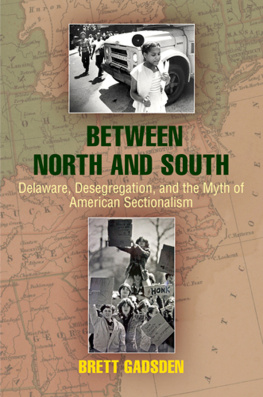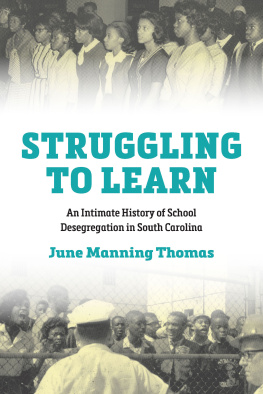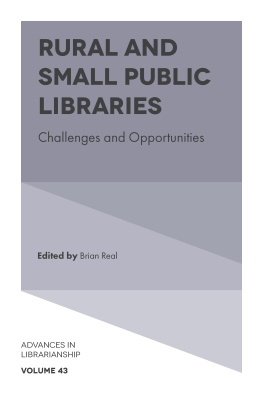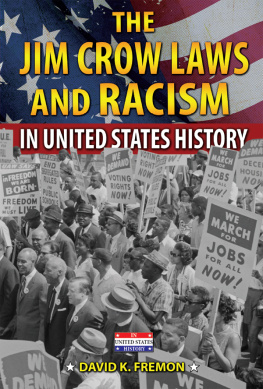THE DESEGREGATION OF PUBLIC LIBRARIES
IN THE JIM CROW SOUTH
THE DESEGREGATION
OF
PUBLIC LIBRARIES
IN THE
JIM CROW SOUTH
Civil Rights and Local Activism
WAYNE A. WIEGAND | SHIRLEY A. WIEGAND
Louisiana State University Press Baton Rouge
Baton Rouge
Published with the assistance of the Michael H. and Ayan Rubin Fund
Published by Louisiana State University Press
Copyright 2018 by Louisiana State University Press
All rights reserved
Manufactured in the United States of America
FIRST PRINTING
DESIGNER: Michelle A. Neustrom
TYPEFACES: Whitman, text; Meltow San 200
PRINTER AND BINDER: Sheridan Books, Inc.
Several paragraphs from chapter 1 first appeared in Wayne A. Wiegand, Part of Our Lives: A Peoples History of the American Public Library (New York: Oxford University Press, 2015), and are reproduced by permission of Oxford University Press.
Several paragraphs from chapters 7 and 8 first appeared in Wayne A. Wiegand, Forgotten Heroes in Civil Rights History, American Libraries 48 (June 2017): 37.
Portions of chapter 9 and the epilogue first appeared in Wayne A. Wiegand, Any Ideas? The American Library Association and the Desegregation of Public Libraries in the American South, Libraries: Culture, History, and Society 1, no. 1 (March 2017): 122, copyright 2017 by the American Library Associations Library History Round Table. This article is used by permission of The Pennsylvania State University Press.
LIBRARY OF CONGRESS CATALOGING-IN-PUBLICATION DATA
Names: Wiegand, Wayne A., 1946 author. | Wiegand, Shirley A., author.
Title: The desegregation of public libraries in the Jim Crow South : civil rights and local activism / Wayne A. Wiegand and Shirley A. Wiegand.
Description: Baton Rouge : Louisiana State University Press, [2018] | Includes bibliographical references and index.
Identifiers: LCCN 2017038119| ISBN 978-0-8071-6867-7 (cloth : alk. paper) | ISBN 978-0-8071-6868-4 (pdf) | ISBN 978-0-8071-6869-1 (epub)
Subjects: LCSH: African Americans and librariesSouthern StatesHistory20th century. | Discrimination in public accommodationsSouthern StatesHistory20th century. | Public librariesSouthern StatesHistory20th century. | Civil rights movementsSouthern StatesHistory20th century.
Classification: LCC Z711.9 .W54 2018 | DDC 027.475dc23
LC record available at https://lccn.loc.gov/2017038119
The paper in this book meets the guidelines for permanence and durability of the Committee on Production Guidelines for Book Longevity of the Council on Library Resources. 
To the black youths
who risked their lives to desegregate
Jim Crow public libraries
in the American South.
A sadly belated Thank you.
CONTENTS
ILLUSTRATIONS
ACKNOWLEDGMENTS
Our thanks to Christine Pawley, who painstakingly went through an earlier draft of this book and gave wise counsel and advice that substantially improved it; Chris Dodge, who compiled the index; the anonymous reader for Louisiana State University Press, who not only carefully screened the manuscript but also prodded us to take a broader perspective; and especially our editor, Rand Dotson, who showed amazing patience with sometimes fussy authors and who certainly made this into a better book.
We also thank former students and colleagues with whom weve discussed ideas and conclusions that found their way into our narrative; Karen Muller of the American Library Association Library, who screened the American Library Association Executive Board minutes for mention of amicus briefs filed by the association between 1954 and 1965; the American Library Association, for a Diversity Grant that Wayne used in May 2012 for research into newspaper databases at the Library of Congress; Emory Universitys Manuscript, Archives, and Rare Book Library for a short-term fellowship in October 2012, and especially Randall Burkett, who made Waynes weeklong stay there so profitable; librarians at the University of WisconsinMadison, and especially Michele Besant of the School of Library and Information Studies; archivists at the Wisconsin Historical Society, where Wayne perused the records of the Louisiana Section of the Congress on Racial Equality, which was so heavily involved in desegregating rural Louisiana public libraries; Marquette University Law School, and especially Dean Joseph Kearney, for supporting this project, and Patricia Cervenka and other law school librarians who helped retrieve research materials at so many stages of this project; Florida A&M University Law School, for supporting this project in so many ways while Shirl was visiting professor there from 2008 through 2011; librarians at Florida State University, and especially the School of Informations Goldstein Library director, Pamala Doffek, and her staff, many of whom helped this project in so many ways; librarians and archivists at the Library of Congress (where Wayne spent weeks going through newspaper databasesespecially the ProQuest African American newspapersand several days going through the papers of the National Association for the Advancement of Colored People in the Manuscripts Reading Room); archivists at the University of Illinois at Urbana-Champaign (where Wayne consulted the American Library Association Archives); librarians and archivists at the Virginia State Library in Richmond, the University of South Carolina Library in Columbia, the University of Georgia in Athens, the Louisiana State University in Baton Rouge, the Alabama State Department of Library and Archives in Montgomery, and the Mississippi Department of Library and Archives in Jackson, where Wayne perused microfilmed newspapers from small towns within each state; librarians and archivists at the Civil Rights Museum in Albany, Georgia, where director Lee Formwalt showed Shirl documents relating to the desegregation of the public library and where Wayne and Shirl perused copies of local newspapers; archivists at the National Archives and Records Service in Philadelphia; librarians at the Auburn Avenue Research Library on African American Culture in Atlanta, who kindly copied and mailed to us a transcript of an oral history interview with Annie McPheeters, longtime director of Atlantas black public libraries; and indirectly the National Endowment for the Humanities, for a Fellowship for University Teachers for Wayne in 20089 that funded research for a book entitled Part of Our Lives: A Peoples History of the American Public Library (2015), which Wayne also used to screen huge newspaper databases at the Library of Congress for valuable information used in The Desegregation of Public Libraries in the Jim Crow South.
THE DESEGREGATION OF PUBLIC LIBRARIES
IN THE JIM CROW SOUTH
INTRODUCTION
When did the civil rights movement begin? Upon being asked that question in the 1980s, native Mississippian and white Baptist minister Will B. Campbell, who had bravely escorted terrified black students through hostile crowds into the previously segregated Little Rock (Ark.) Central High School in 1957, showed no hesitation. For black people, he said, it began the first day an African slave was forcefully brought to North American shores. For southern whites, however, he insisted it was the Montgomery, Alabama, bus boycott in 1955. In the minds of white people, Campbell said, harmonious race relations persisted only when they had their foot on black peoples necks and the blacks werent struggling to get up. Although the Supreme Court had issued its Brown v. Board of Education decision declaring separate but equal public schools unconstitutional in 1954, not many people in the South took the decision seriously. But the bus boycott was a different thing. I would say the Movement as white people experienced it began with Rosa Parks and ended on the balcony of the Lorraine Motel when Martin Luther King Jr. was assassinated on April 4, 1968. Civil rights historians often refer to the years 195468 as the Second Reconstruction.
Next page





 Baton Rouge
Baton Rouge